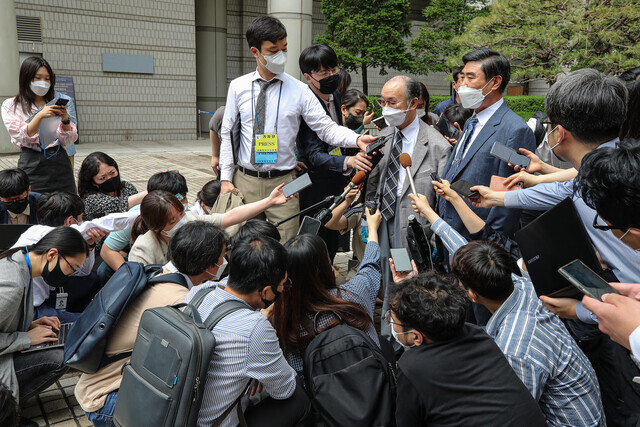hankyoreh
Links to other country sites 다른 나라 사이트 링크
[Editorial] When courts ignore human rights, there’s no future for S. Korea-Japan relations

There has been strong pushback against the June 7 decision by Kim Yang-ho, senior judge in the 34th Civil Division at the Seoul Central District Court, to dismiss a raft of damages lawsuits filed against 16 Japanese companies implicated in war crimes by 85 victims of forced labor during the Japanese colonial period and their surviving family members.
This shoddy ruling, which peddled one-sided arguments about national security and foreign policy while disregarding the human rights of the victims, has become the target of vocal criticism from legal experts and many others.
Meanwhile, the conservative press is pathetically championing the dismissal, as if a lowly district court could overturn the Supreme Court’s 2018 en banc ruling that awarded compensation for forced labor.
The district court’s argument is that the forced labor victims are unable to exercise their right to claim damages against Japanese companies because the damages issue was completely resolved by a claims agreement reached by South Korea and Japan in 1965.
Referring to the Supreme Court’s decision in October 2018 to award the forced workers compensation because of the “illegality of colonial rule,” the district court said that “the illegality of colonial rule and the illegality of labor conscription are both interpretations based on domestic law” — flatly contradicting the Supreme Court.
That position parrots a geopolitical logic catering to aggressor states, while blithely absolving aggressors of any illegality that they refuse to admit to.
The court also made irrelevant points to support its decision, arguing that the “miracle on the Han River” was made possible by foreign currency provided by Japan. The court further said that siding with the plaintiffs “would damage relations with Japan and might ultimately damage relations with the US, which are directly tied to our national security in the form of the South Korea-US alliance.”
The judicial system is supposed to provide remedies to the victims of human rights infringements based on strict jurisprudence. In that sense, this ruling’s inexplicable reliance on arguments about foreign policy and international influence is extremely regrettable.
Despite this decision, the Supreme Court’s 2018 en banc ruling remains the authoritative precedent for the judiciary. We anticipate the district court’s decision is likely to be overturned on appeal.
But the conservative papers were up to their old tricks, trying to goad the public by overselling the ruling. The Chosun Ilbo said that “the court of first instance gave a point-by-point rebuttal of the decision reached by the Supreme Court under Kim Myeong-soo,” while the Joongang Ilbo said that “the reversal of the Supreme Court’s decision right before the G7 summit brings us into a time of diplomacy.”
South Korea’s relations with Japan need to be mended. But the two countries’ relations cannot move into the future if we deny the illegality of Japan’s colonial rule and disregard the human rights of the individuals who suffered grievous harm under that rule.
The statist and extralegal logic littered throughout this ruling make it a stumbling block. The right approach is to make legal decisions through a strict application of jurisprudence, while applying diplomacy in parallel.
We hope that the South Korean government will humbly accept the points raised by critics, who maintain that by insisting on its inability to meddle in a judicial decision, it failed to make an adequate diplomatic effort to help the victims actually receive an apology and compensation from Japan. We also hope Seoul will make a more active and practical effort to find a diplomatic solution and improve relations with Japan.
Please direct comments or questions to [english@hani.co.kr]

Editorial・opinion
![[Column] Park Geun-hye déjà vu in Yoon Suk-yeol [Column] Park Geun-hye déjà vu in Yoon Suk-yeol](https://flexible.img.hani.co.kr/flexible/normal/500/300/imgdb/original/2024/0424/651713945113788.jpg) [Column] Park Geun-hye déjà vu in Yoon Suk-yeol
[Column] Park Geun-hye déjà vu in Yoon Suk-yeol![[Editorial] New weight of N. Korea’s nuclear threats makes dialogue all the more urgent [Editorial] New weight of N. Korea’s nuclear threats makes dialogue all the more urgent](https://flexible.img.hani.co.kr/flexible/normal/500/300/imgdb/original/2024/0424/7317139454662664.jpg) [Editorial] New weight of N. Korea’s nuclear threats makes dialogue all the more urgent
[Editorial] New weight of N. Korea’s nuclear threats makes dialogue all the more urgent- [Guest essay] The real reason Korea’s new right wants to dub Rhee a founding father
- [Column] ‘Choson’: Is it time we start referring to N. Korea in its own terms?
- [Editorial] Japan’s rewriting of history with Korea has gone too far
- [Column] The president’s questionable capacity for dialogue
- [Column] Are chaebol firms just pizza pies for families to divvy up as they please?
- [Column] Has Korea, too, crossed the Rubicon on China?
- [Correspondent’s column] In Japan’s alliance with US, echoes of its past alliances with UK
- [Editorial] Does Yoon think the Korean public is wrong?
Most viewed articles
- 1‘We must say no’: Seoul defense chief on Korean, USFK involvement in hypothetical Taiwan crisis
- 2N. Korean delegation’s trip to Iran shows how Pyongyang is leveraging ties with Moscow
- 3‘Weddingflation’ breaks the bank for Korean couples-to-be
- 4[Reportage] On US campuses, student risk arrest as they call for divestment from Israel
- 5Amnesty notes ‘erosion’ of freedom of expression in Korea in annual human rights report
- 6[Column] Park Geun-hye déjà vu in Yoon Suk-yeol
- 7Korea sees more deaths than births for 52nd consecutive month in February
- 8[Editorial] New weight of N. Korea’s nuclear threats makes dialogue all the more urgent
- 9Will NewJeans end up collateral damage in internal feud at K-pop juggernaut Hybe?
- 10[Guest essay] The real reason Korea’s new right wants to dub Rhee a founding father